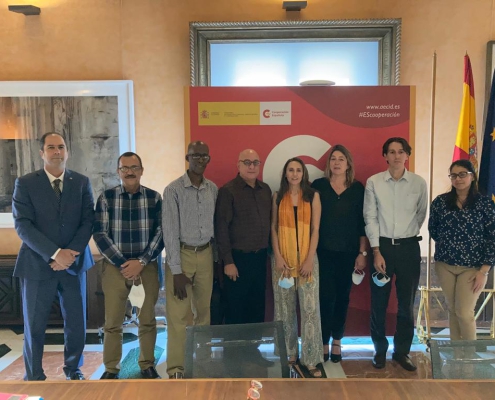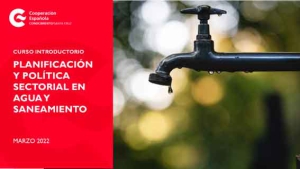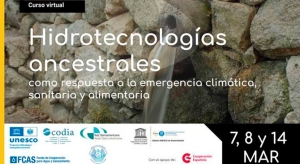Governance and institutional strengthening
Fostering institutional strengthening and community development
Fostering institutional strengthening and community development
To support the improvement of global water governance in partner countries, the Water Fund is committed to institutional strengthening and community development.
This has been done in several ways, for example:
Actions to accompany partner countries
 In 2022, support to partner countries to improve water governance has been maintained. Among other actions, this year, the Fund has continued working with the INRH of the Dominican Republic to implement the National Plan for Sustainable Use of Water Resources; drought management plans have been promoted with the Ministry of Environment and Water of Bolivia; support has been offered to the National Institute of Water Resources of Cuba through technical exchange and training, and the development of the Technical Guide for hydrological planning at the regional level with a vision of Integrated Water Resource Management1 has continued.
In 2022, support to partner countries to improve water governance has been maintained. Among other actions, this year, the Fund has continued working with the INRH of the Dominican Republic to implement the National Plan for Sustainable Use of Water Resources; drought management plans have been promoted with the Ministry of Environment and Water of Bolivia; support has been offered to the National Institute of Water Resources of Cuba through technical exchange and training, and the development of the Technical Guide for hydrological planning at the regional level with a vision of Integrated Water Resource Management1 has continued.
1 All these actions are explained in more detail in section 3.2 Public Policy Impact.
Support for hydrological planning within the framework of IWRM
In this area, the Fund is preparing a Technical Guide for Hydrological Planning within the framework of IWRM. This publication, aimed at the Latin American field, is part of a commitment agreed upon during the XIX CODIA meeting held in 2018. It established the need for a reference document that would provide criteria and recommendations regarding the objectives and results of water planning. A guide that would include the region’s countries and institutions and offer practical and technical content, taking advantage of the experience acquired and responding to the difficulties encountered in preparing IWRM plans.
In the year 2022, work has been carried out on the preparation of the first section of this Guide, the Report on the Legal and Institutional Framework of Ibero-America on water issues with an emphasis on IWRM and hydrological planning, which was presented at the CODIA meeting in November. In addition, work has begun on the preparation of the Conceptual Framework, the purpose of which is to establish objectives, instruments, and essential criteria that will serve as the basis for developing the Guide. In addition, a bidding process has been launched to contract a supplier to undertake the final drafting of the document.
Support for developing the sanitation and wastewater treatment sector.
An adequate regulatory framework and sectoral planning are fundamental in the sanitation sector. They should contemplate essential aspects beyond infrastructure, incorporating elements such as the organization of the service, the development of the regulatory framework, training, and public awareness.
Wastewater management must be carried out from an integral perspective in a planned and coordinated manner among the various entities involved in the process, and this requires adequate economic and human resources. Aware of these needs, the Water Fund has worked specifically on multiple aspects to promote sanitation and wastewater treatment in the region
With the support of CEDEX, as technical assistance to the FCAS, a regional strategy has been developed to support countries in revising their sectoral regulations so that the legislation and the technologies used are adapted to their needs. For example, we have collaborated with Guatemala on changing its discharge regulations and with El Salvador regarding reuse and sludge regulations.
In addition, in 2022, the development of the Platform on sectoral regulations has been promoted, a tool that is conceived as a permanent working space aimed at a network of experts in the water sector from countries in the region to hold discussions and exchange experiences on the topics included in the CODIA Work Program. Two working groups are currently active, one on discharge regulations and the other on wastewater reuse, although new groups are expected to be formed soon.
In collaboration with CODIA, we have promoted the drafting of recommendations for sanitation sector planning at the regional level, which will include a series of methodological guides for carrying out fundamental studies, work led by the Center for Public Works Studies and Experimentation (CEDEX).
Also, in collaboration with CEDEX, work is being done on a series of knowledge products to support the implementation of sanitation and wastewater treatment projects. Specifically, in 2022, the guide entitled Selection of Treatment Technologies has been published to provide basic knowledge to both planners and technicians of the administrations to support them in making an adequate selection of treatment technologies.
Analysis of indicators:
During 2022, the Fund continued to support studies on the degree of compliance with the SDG6 indicators in Ibero-American countries. In December, the Analysis of Indicator 6.5.2 was published jointly with CODIA.
Progress and challenges in transboundary water cooperation in Ibero-American countries. A publication that follows the line of work begun the previous year with the analysis of indicator 6.5.1.
Much more than just having the necessary infrastructure, the key to the service is to manage it safely and efficiently, both from an organizational point of view and from the perspective of making the best use of the resource. To promote the sustainability of water and sanitation services, it is essential to work together with service operators. In this sense, throughout 2022, several activities have been carried out, among which the following are worth mentioning:
Training and education
Technical assistance and twinning
One of the ways in which the Water Fund supports capacity building in partner countries is through Water Operator Partnerships (WOPS). So far, this type of twinning has been implemented in Bolivia, Honduras, and Ecuador and has proved to be a highly useful tool for promoting exchanges and knowledge.
In 2022, twinning arrangements continued between EMASESA (Empresa Metropolitana de Abastecimiento y Saneamiento de Agua de Sevilla) and various operators, such as Aguas de la Sierra de Montecillos (ASM), created under a Fund program in Honduras and Portoaguas (in Ecuador).
As part of the first initiative, ASM’s technical team traveled to Seville to learn about and identify tools and processes to strengthen the management of the Honduran water utility. The Spanish company also visited Honduras to support the progress of the ongoing action plan.
In the case of Portoaguas (Ecuador), two missions have been carried out. A visit of technicians from the Ecuadorian company to Seville to learn about the operation of EMASESA, and a second meeting, this time in Ecuador, to work on the pilot plans for non-revenue water and management of water leak detection equipment; automation and implementation of Aquarating.
Related News:
Related Video:
Development of tools adapted to small operators to provide a quality service.
In 2022, the FCAS has worked on implementing a specific tool to improve the sustainability of supply, sanitation, wastewater treatment, and, optionally, waste management operators, mainly in rural and peri-urban areas. This tool, called Integral System of Sustainability and Institutional Strengthening (SISRI), focused on small operators in the Latin American and Caribbean region, has a comprehensive approach and makes it possible to understand, analyze, and evaluate the operator to provide modernization measures in the economic, technical, social and environmental spheres. To this end, a set of questionnaires, analysis and evaluation models, methodological guides, asset management systems, and other support products have been designed to define from the outset the guidelines for the Operator Improvement Plans that should be implemented based on the assessment of the different factors analyzed, as well as the launching of new investment programs. It is being consolidated after successfully completing tests in El Salvador, Guatemala, and Honduras.
The objective is that this tool can be used both in Institutional Strengthening initiatives for existing operators and in the identification phase of new projects, and can be applied in FCAS programs and countries of action, but also in other areas or by other agents, such as municipalities, national administration, other cooperation agencies, NGOs, etc.
SISRI is intended to complement the work done through AquaRating, a system for larger operators in which FCAS has also participated, along with other donors with the European Union, through the Latin America Investment Facility (LAIF) and the AquaFund Multi-Donor Fund.
The Water Fund conceives capacity building in an integrated manner to accompany all sector stakeholders. Therefore, it works through multiple processes and tools:
Training activities within the programs
Most FCAS programs incorporate training on technical issues (maintenance of water systems, regulation of the sector, human rights, etc.) at both community and institutional levels and awareness-raising activities on the use of the resources, the importance of hygiene, etc.
Water Grants
In 2022, AECID’s Water Scholarships enabled 21 students from Latin America and the Caribbean to receive specialized training in the water and sanitation sector at Spanish universities and research centers. The scholarships aimed to train young professionals from Latin America with at least two years of experience in urban water supply and sanitation systems through specific master’s degrees so that they could return to their countries of origin and put what they had learned into practice. Some of them also came from entities that have worked as partners in the Water Fund programs, thus contributing to strengthening the public institutions with which we work.
Related News:
Networking
The training work is carried out at various levels so that the knowledge acquired permeates all stakeholders, ensuring the sustainability of the programs:
 At the national level, work is conducted with national ministries and agencies, for example, to update regulatory standards on water quality, management, and handling, and various organizational areas related to water management. A practical case was the course on sectoral planning and policy in water and sanitation for Paraguayan officials, held jointly with the Directorate of Public Water and Sanitation (DAPASAN) and the country’s Ministry of Public Works.
At the national level, work is conducted with national ministries and agencies, for example, to update regulatory standards on water quality, management, and handling, and various organizational areas related to water management. A practical case was the course on sectoral planning and policy in water and sanitation for Paraguayan officials, held jointly with the Directorate of Public Water and Sanitation (DAPASAN) and the country’s Ministry of Public Works.Related News:
Among other activities, in 2022, several workshops were held in coordination with Intercoonecta:
- Human right to water and sanitation: Advances and Challenges, (July 2022) to promote the exchange of experiences in implementing the human right to water. This meeting was held in person at the Training Center in Santa Cruz de la Sierra before the VI Latinosan Conference. Link to the course >>
- Ancestral hydro technologies as a response to the climate, health, and food emergency (March 2022) to enhance the value of this knowledge as intangible cultural heritage linked to water management and its adaptation to the current climate and health emergency context. Link to the course >>
In addition, workshops for exchanging experiences between countries are facilitated and financed, and common recommendations are developed. The Fund maintains a close relationship with CODIA and supports the work of regional networks such as RIOCC (Ibero-American Network of Offices against Climate Change) or CIMHET (Conference of Directors of Ibero-American Meteorological and Hydrological Services).
.
Cooperation Fund for Water and Sanitation
Av. Reyes Católicos 4 – 28040 Madrid
dfcas@aecid.es

